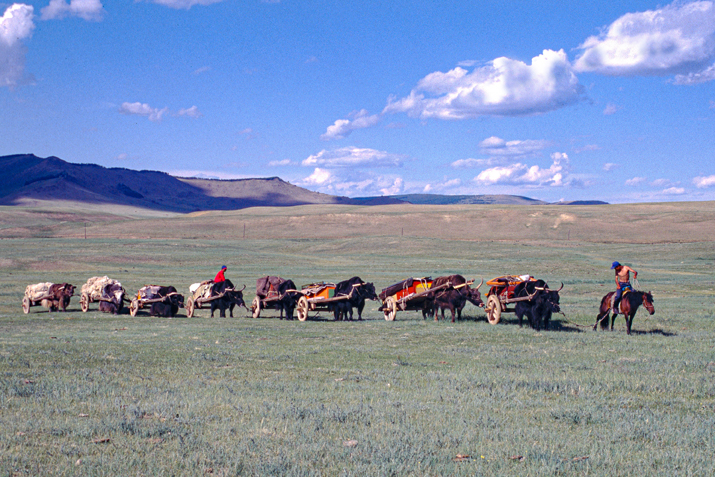
The first day in Tsagaan Nuur
N 51°21'785'' E 099°21'046''
Day: 102
Sunrise:
08:18
Sunset:
17:53
Total kilometers:
1146
Soil condition:
Ice, snow
Temperature – Day (maximum):
minus 18°C
Temperature – day (minimum):
minus 25°C
Temperature – Night:
minus 33°C
Latitude:
51°21’785”
Longitude:
099°21’046”
Maximum height:
1475 m above sea level

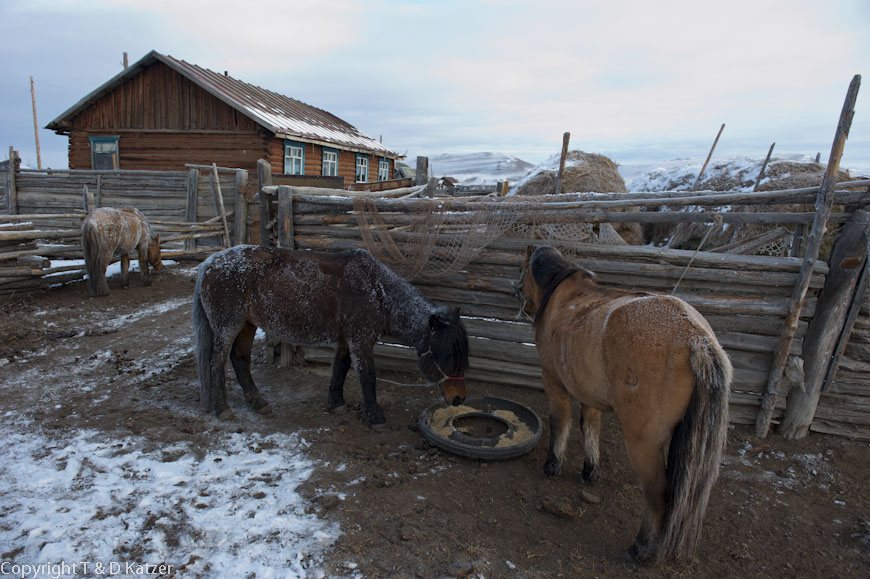

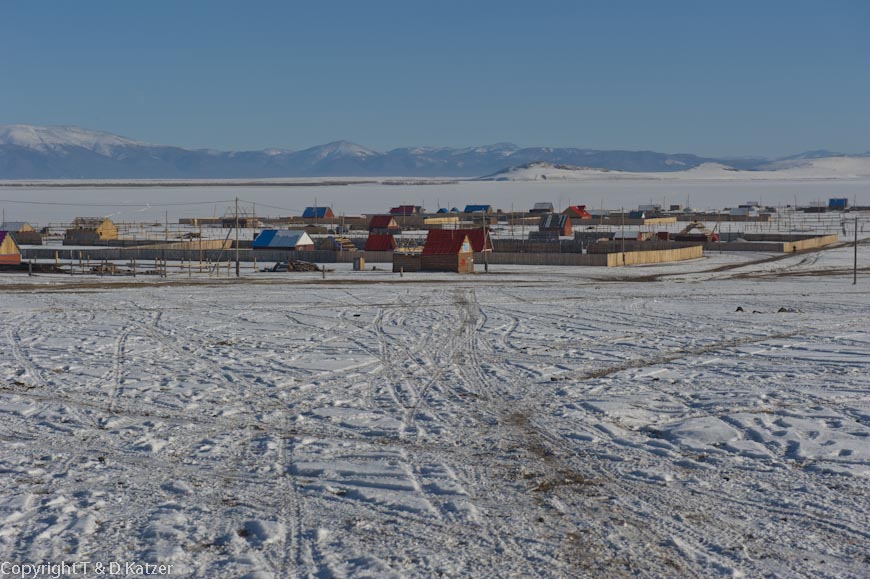
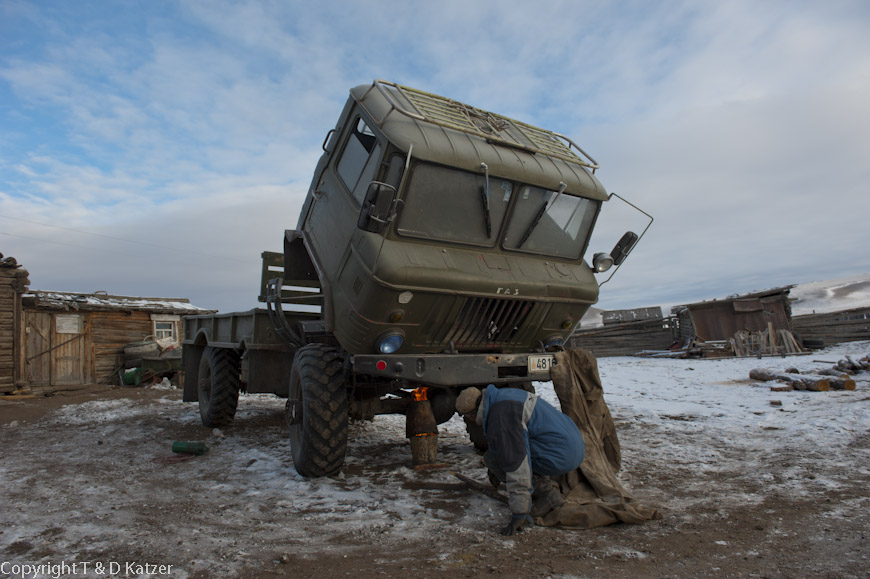
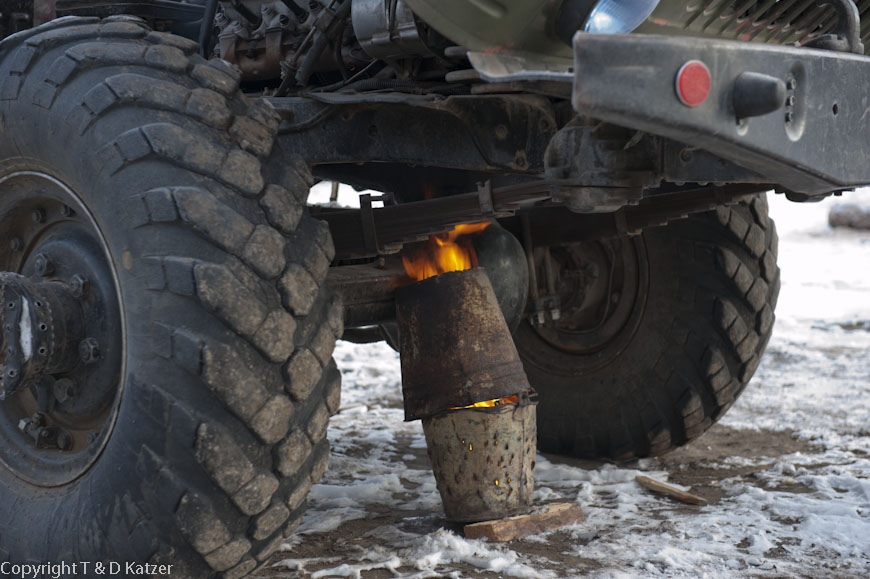

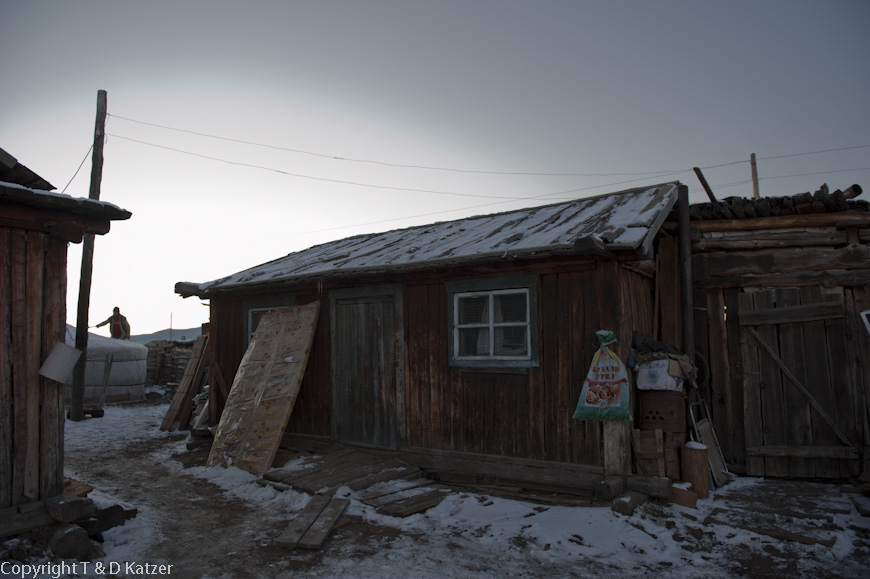
The first night in our yurt was a dream compared to an icy, unprotected tent. We get up late and comfortably prepare breakfast on our wonderful cannon stove. “Denis?” “Yes.” “I think I froze my toes,” Tanja shocks me. “What?” “Well, the tips are numb,” she whines a little. “It’s slight frostbite. They’ll go away after a while. You don’t need to worry about that.” “How do you know that?” “Don’t you remember? I froze my toes on the bus ride from China to Lhasa. The feeling came back a year later.” “A year? You’re joking, right?” “No, I’m not joking. It took that long. But I think your toes will be completely healthy again in a few weeks,” I say confidently. “I hope so,” Tanja replies, a little unsettled.
Although we are very tired from the strenuous journey, there is a huge amount to do. So we don’t have the opportunity to hang around for a few days. If you want to survive a Mongolian winter in a yurt, you have to be an activist.
First we check the equipment that Saraa has already sent to Tsagaan Nuur and is now stacked in Ayush’s shed. As far as we can see, it is complete. So nothing has been lost on the long journey from Mörön to here. Our young horseman Tulgaa accompanied and supervised the transport. He visits us in the yurt first thing in the morning. He speaks a few words of English, so communicating with him is no problem. We immediately take a look at the horses. “And what do you think of her condition? We’ve gone to a lot of trouble to find a suitable feeding place every day. “Not bad,” praises Tulgaa. “Take a look at Naraa. She’s shivering with cold,” says Tanja. “It was an exhausting trip. A few days break and she’ll be fit again,” I think. “Is she really pregnant?” Tanja ponders. Tulgaa and Bilgee nod. “Yes, she will have a foal in the spring,” Bilgee confirms the statement he already made in Mörön. “When would you like to set off for Mörön with our horses?” I ask Tulgaa. “As the temperatures will soon drop further, tomorrow,” he replies amiably. “Tomorrow already. Hm, are the horses strong enough for that?” I wonder. “Yes, they no longer have to carry any loads. They can do that easily,” says Tulgaa. “Will it be difficult to drive the horses alone?” Tanja wants to know. “Ha, ha, ha,” he laughs heartily. “It’s not difficult for Tulgaa.” “How long will it take you to cover the distance? What do you think?” I ask. “Three, maximum four days,” we hear in amazement. “What, three or four days?” I ask, confused. “Yes,” he confirms. “For a horse man, 100 kilometers a day is easily doable,” Bilgee attests. I’m not sure if Tulgaa is running his mouth a little. Although we only took one forced rest day and the day we set off can hardly be counted because of the evening start, it took us 14 days to cover the 369 kilometers. If we subtract the forced rest day, the day of our very late start and getting lost in the labyrinth of lakes, we would have made it in 11 days. For Tanja and me it would be a miracle in these weather conditions and with the difficult route if he could manage to ride six horses alone over rivers, lakes, ice, passes and through the forests of the taiga in such a short time. But we’ll see.
In the afternoon, Bilgee and Tulgaa give our horses oats to eat. At our request, Saraa sent us 20 kilograms of this power food. It is intended to strengthen our mounts and provide energy for the return journey. Back in our yurt, we cook a few kilograms of the oats. The horses are to be given this mash tomorrow before they set off. Tulgaa takes the remaining 15 kg in saddlebags as emergency rations.
If we thought the water supply in Mörön was expensive, we were very much mistaken. In the city, there was a pump house at every major intersection where we walked with a few canisters to have them filled for a little Tugrik. Here, people walk to Tsagaan Nuur, the white lake after which the village is named. Holes are cut into the ice surface, from which the water is filled into a bucket with a ladle and then dragged up the embankment and carried with long arms to our yurt. We are lucky because Ayush’s baishin (log house) is only about a kilometer away from the lake. Others have to carry their daily water consumption over five kilometers. Under such conditions, you first appreciate what a luxury it is to be able to let water, hot or cold, flow from the tap. Here in Tsagaan Nuur there is nothing like this in any house. Tanja and Bilgee pour the water into a blue plastic barrel, which is now the water reservoir in our yurt. Although we use the water sparingly, Tanja has to go to the lake up to twice a day.
Then we have to go to the border military to register. A soldier asks us to wait at a fence. A little later, he gives us back the border zone permit that every foreigner who comes closer than 100 km to the Russian border needs. The maximum length of stay is one month. We have agreed with Saraa to send the paper back to Mörön every month, where she has it renewed. How we get the apparently important paper from the Tsataans’ winter camp to Mörön and back, we don’t know at this point. This will hopefully be clarified at a later date.
In the next few days we still have to go to the local police station to register and to the mayor of the town to register us as new citizens with the address East Taiga. So even in the remoteness of the world, we have a lot of bureaucracy. It’s strange how difficult we humans make it for each other and how we humans control each other and our living space.
After the extensive work, we retire to our yurt in the evening. To celebrate the success of our expedition, Tanja has bought a fine bottle of vodka in a store, which Tulgaa, Bilgee, Tanja and I empty.
We lay down early on the sleeping mats to sleep. Tulgaa is also spending the night with us tonight. We prepare a felt mat and blanket for him so that he doesn’t freeze. “So each of you will reheat the stove every two hours. If that works, we’ll have a warm night,” I say to Bilgee and Tulgaa. They laugh and nod. They sleep soundly because of the vodka consumption. Tired, I get up every two hours to add wood. Then I crawl back into my sleeping bag and listen to the singing of the White Lake. The stress cracks in the ice cover, which is getting thicker every day, thunder right into our yurt, even though the lake is barely a kilometer away from our yurt.
We look forward to your comments!

